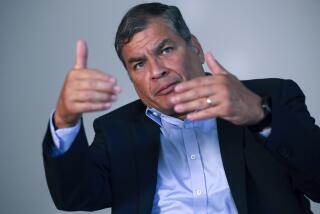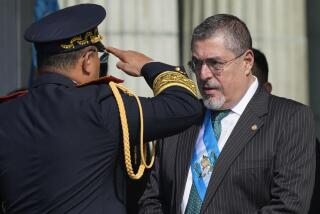Ecuador Names a New President, Ending Crisis
- Share via
QUITO, Ecuador — In a compromise that avoided a return to military rule, Ecuador’s vice president took the helm of this Andean nation Saturday, ending a political crisis sparked by an alliance of indigenous protesters and junior officers.
Gustavo Noboa became the troubled country’s sixth president in four years after top-ranking officers, facing international pressure, refused to permit a civilian-military triumvirate that had announced it was taking power Friday. Nevertheless, the short-lived junta was an important demonstration of the growing power of a movement that represents the approximately one-third of Ecuador’s 12 million people who are indigenous.
Indian protesters opposed to ousted President Jamil Mahuad’s economic policies, including making the U.S. dollar Ecuador’s currency, had received the support of some military units Friday to rush and then occupy the empty Congress building here in the capital in an effort to overthrow the government. They announced the formation of a junta that included indigenous leader Antonio Vargas, Col. Lucio Gutierrez and Carlos Solorzano, a former chief justice of the country’s Supreme Court who tried to declare himself president during a similar crisis three years ago.
“To call them the Three Stooges would be generous,” lawmaker Ramiro Rivera said of the coup attempt. “It was embarrassing.”
Ecuador was ruled sporadically by military governments in the mid-20th century but has been under civilian rule since 1979.
Amid the chaos Friday, Mahuad refused to resign. Nations throughout the Americas and Europe protested the coup d’etat and threatened to cut off aid and credit lines. Then, early Saturday, military chief Gen. Carlos Mendoza took Gutierrez’s place in the junta and dissolved it, offering the presidency to Noboa.
Later, Mahuad acknowledged that he had been deposed, hours before Congress, meeting in special session, confirmed his replacement by the vice president. But even then, he emphasized in a televised speech that he was not quitting but was being forced out.
Quito and the country’s commercial center, Guayaquil, were returning to normal Saturday but without any of the jubilation that marked the ouster three years ago of former President Abdala “El Loco” Bucaram, who was declared mentally incompetent by Congress.
Noboa, 62, still faces the problems of runaway inflation, hyper-unemployment and a shrinking economy that foiled Mahuad, who insisted that he will not leave the country. As the former rector and law school dean of the respected Catholic University, Noboa has little political base, but he does have an unchallenged reputation for personal integrity, giving him a moral authority that former Vice President Eduardo Pena said will be his great strength.
In accepting the presidency, Noboa said his priority will be to open a dialogue with the indigenous citizens whose protests provoked the crisis. But persuading them to talk may prove difficult.
Their leaders said Saturday that they had been betrayed by their erstwhile military allies and that they did not recognize Noboa’s government.
“Their situation changed radically, from yesterday to this morning: from having representation in the junta to returning home with nothing,” Hernan Ramos Benalcazar, a columnist at the respected daily newspaper El Comercio, said Saturday.
“All that has changed is the people,” lamented one protester, who asked not to be named. “We still have the dollarization, we still have privatization, we still have the hunger and misery of the people.”
The indigenous protesters failed, Ramos Benalcazar explained, because their demands were too radical for the rest of the country. They had proposed dissolving Congress and the Supreme Court as well as removing the president. Still, by forcing Mahuad from office, the columnist said, they confirmed the vigor of their largely rural movement, which has been growing for the last decade.
“At least we sent that thief home,” the protester said of the ousted president.
During his 17 months in office, Mahuad had been steadily losing popularity because of Ecuador’s worst economic depression in 70 years. Then he was caught in the midst of a financial scandal, a $1.2-billion bailout of 18 corrupt banks. And further tarnishing his reputation, a banker jailed for fraud claimed that he had contributed $3.1 million to the president’s 1998 campaign.
More to Read
Sign up for Essential California
The most important California stories and recommendations in your inbox every morning.
You may occasionally receive promotional content from the Los Angeles Times.










